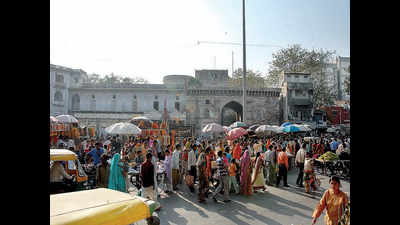- News
- City News
- ahmedabad News
- Citizens’ legacy: Ahmedabad heritage through the lens of stakeholders
Trending
This story is from February 4, 2019
Citizens’ legacy: Ahmedabad heritage through the lens of stakeholders
When the city got India’s first Unesco World Heritage City (WHC) tag after a long campaign two years ago,

The flea market at Bhadra Plaza in the city
AHMEDABAD: When the city got India’s first Unesco World Heritage City (WHC) tag after a long campaign two years ago, it also posed a number of questions related to history and heritage, ownership of the past, conservation and most importantly, how multiple stakeholders, ranging from AMC and ASI to local residents, traverse the layers of Walled City to come to a common vision.
Dr Jigna Desai, associate professor at faculty of architecture, Cept University, provided a perspective on the topic with her book ‘Equity in Heritage Conservation — The Case of Ahmedabad’ which is extension of her doctoral thesis. Dr Desai studied realities of cultural heritage conservation and management through three prominent heritage sites — Bhadra Plaza Redevelopment Project, Sankadi Sheri transformations and Kavi Dalpatram Chowk Project.
“The processes of assessing values and significance of historic sites need to shift from the essentialised modernist narrative to a post-modern one that understands values as constructs of present sensibilities. Values of places and elements are held by people and are always interpreted with reference to the politics of change,” she said.
“Access to heritage as an economic resource, its relationship to their quality of life and its potential to create a sense of belonging makes heritage assets enablers of equity. In addition to this, many of these sites are in dire need of infrastructure for basic health, hygiene, safety and mobility,” said Desai.
Dr Jigna Desai, associate professor at faculty of architecture, Cept University, provided a perspective on the topic with her book ‘Equity in Heritage Conservation — The Case of Ahmedabad’ which is extension of her doctoral thesis. Dr Desai studied realities of cultural heritage conservation and management through three prominent heritage sites — Bhadra Plaza Redevelopment Project, Sankadi Sheri transformations and Kavi Dalpatram Chowk Project.
“The processes of assessing values and significance of historic sites need to shift from the essentialised modernist narrative to a post-modern one that understands values as constructs of present sensibilities. Values of places and elements are held by people and are always interpreted with reference to the politics of change,” she said.
“Access to heritage as an economic resource, its relationship to their quality of life and its potential to create a sense of belonging makes heritage assets enablers of equity. In addition to this, many of these sites are in dire need of infrastructure for basic health, hygiene, safety and mobility,” said Desai.
Talking about her findings, she mentioned that heritage places, even when determined as valuable, are a constellation of material culture and elements where a particular element can be valued for different purposes by different stakeholders. In all cases, since the intention to conserve, to develop or to capitalise (socially or economically) the heritage are triggered by the World Heritage Nomination, the extraordinary aspects of values overshadow the need for day-to-day accesses, she added.
End of Article
FOLLOW US ON SOCIAL MEDIA











